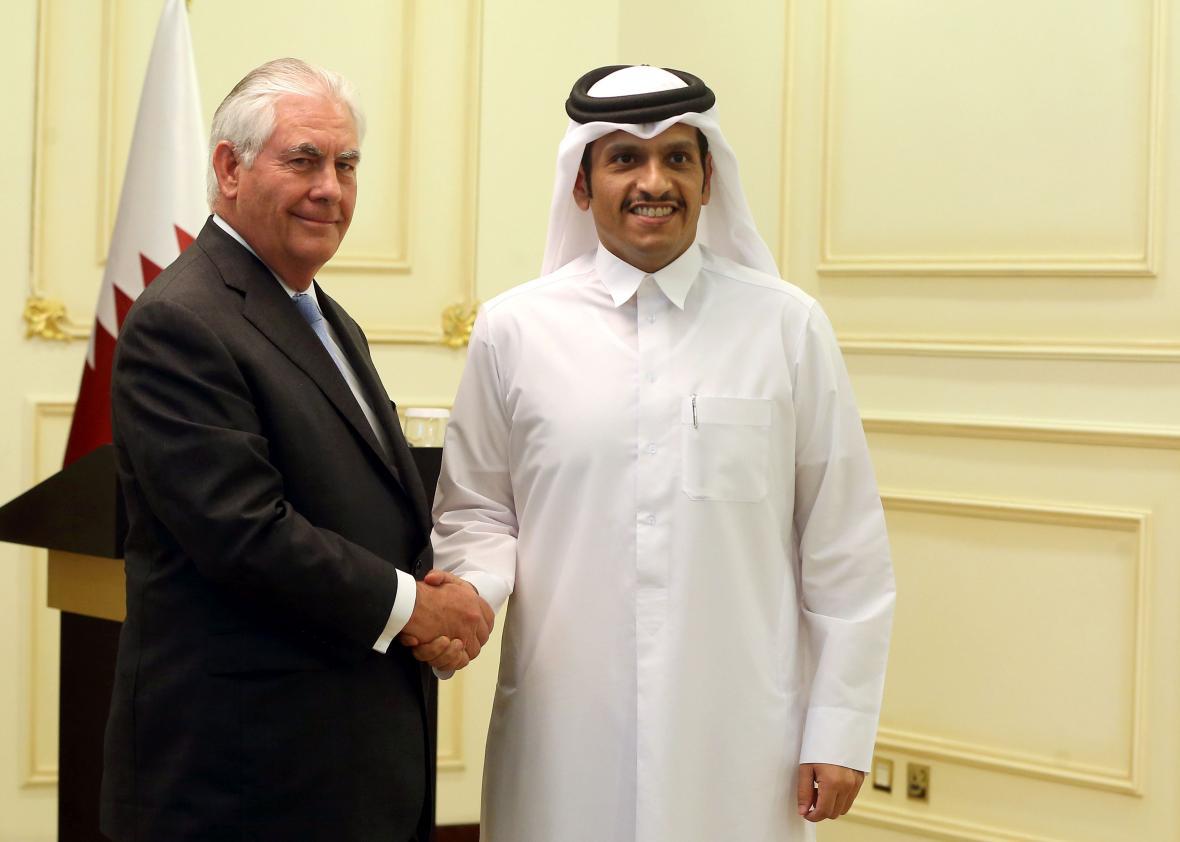U.S. Secretary of State Rex Tillerson faces a massive diplomatic challenge this week as he visits Persian Gulf allies in a bid to end the standoff between Qatar and its neighbors—a task made particularly thorny because his boss, President Donald Trump, has already firmly sided against Qatar in the matter. Tillerson arrived in Kuwait on Monday, and his four-day visit includes stops in Qatar and Saudi Arabia.
The crisis began when Saudi Arabia, the United Arab Emirates, Egypt, and Bahrain cut off diplomatic ties with Qatar on June 5 and subsequently imposed a land, air, and sea blockade of their Gulf neighbor. The four countries have accused Qatar of supporting terrorist groups including the Muslim Brotherhood and Hezbollah, an accusation the Qatari government calls “baseless.” On June 22, Kuwait, acting as a mediating third party, presented Qatar with a list of 13 demands as preconditions for the lifting of sanctions. Doha has rejected that ultimatum, creating an impasse.
Since the announcement of the blockade, President Trump’s remarks on the Gulf crisis have aligned with the Saudi position, and he has shown no willingness to push for reconciliation between the two countries. “So good to see the Saudi Arabia visit with the King and 50 countries already paying off. They said they would take a hard line on funding extremism, and all reference was pointing to Qatar. Perhaps this will be the beginning of the end to the horror of terrorism!,” Trump tweeted on June 6, a day after the blockade was officially announced.
Tillerson’s visit will thus possibly mark a new turn in the United States’ involvement in the Gulf crisis. Contrary to Trump’s tough stance, Tillerson has taken a more reconciliatory approach. Five days after the blockade, Tillerson called on Saudi Arabia and other Gulf countries to ease their restrictions, which were “hindering U.S. military actions in the region and the campaign against ISIS.” (Qatar hosts the largest U.S. military base in Middle East.) “Our expectation is that these countries will immediately take steps to de-escalate the situation and put forth a good faith effort to resolve their grievances they have with each other.”
The success of Tillerson’s trip is consequently fraught with potential pitfalls. It is important that the secretary of state and the White House be on the same page vis-à-vis U.S. policy on the crisis. As Trump has wholeheartedly supported Saudi Arabia’s decision to impose sanctions in meetings with its leadership, and with Saudi Arabia sticking to its hard-line position, it will be difficult for Tillerson to win over Qatar. Tillerson would benefit from a statement from President Trump endowing him with the powers to negotiate with the Gulf countries and break through the impasse, but so far Trump has remained silent regarding Tillerson’s latest diplomatic efforts.
The Washington Post noted Tillerson’s weak position:
The Trump administration is sending out two competing messages on its policy toward Qatar, which reflects the different perspectives of President Trump and Secretary of State Rex Tillerson. As Tillerson works behind the scenes to mediate between America’s feuding Persian Gulf allies, officials and observers say the president’s more aggressive stance could hinder his aide’s ability to succeed.
The former CEO of Exxon Mobil, Tillerson might need more than his rich network of contacts in the region to achieve progress. Kuwait, which has been playing the role of a mediator due to its close relationship with Qatar, has also failed to bring both sides to an agreement. The supposed humanitarian and economic impact of the blockade has yet to take its toll on Qatar, which enjoys the highest per capita income in the world. “Qatar’s economy is robust,” the country’s foreign minister said last month. “If there is some increase in certain areas of cost, it will be compensated in future. That is why our economy will not be affected.” In any diplomatic crisis, resolutions are often reached when both sides feel the urgency to make serious compromises. With its continuing defiance, Qatar shows no signs of that urgency.
In spite of possible failure, Tillerson’s visit to the Gulf is a perfect opportunity for the secretary of state to showcase some diplomatic skill. His tenure so far has proved underwhelming, achieving no big deals for the U.S. and only pleasantries exchanged with foreign dignitaries under the shadow of President Trump. Continued calls for resolution and ease of restrictions demonstrate that Tillerson understands the need for the U.S. to de-escalate the tension in the region and that his efforts might just work. “The GCC must emerge united and stronger to show the world the GCC’s resolve in its fight against violence and terrorism,” Tillerson has said of Saudi Arabia and other members of the Gulf Countries Corp. But this may require more than what the secretary of state can offer to the clashing parties.
